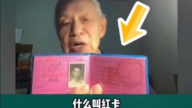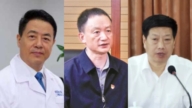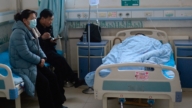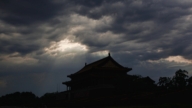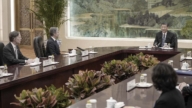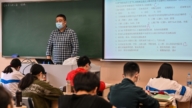【新唐人2012年12月19日訊】新任中共總書記習近平,上任之後備受矚目,有評論形容習近平「開局三招直指中共要害問題」。不過,這個「高帽子」是不是被大多數人接受呢﹖分析人士指出,習近平是「穿新鞋,走老路」。那麼,習近平真的敢點中共的死穴嗎?下面請看專家的分析。
日前,香港《大公網》發表評論文章,大讚習近平的所謂「工作作風八項新規、改革、反腐」,這三項直指中共要害,值得讚譽,展示新氣象等。
文章把這些舉措,稱為「習近平開局三招直指中共要害問題」。而第一招,是習近平在中央政治局關於改進工作作風,密切聯繫群眾的「八項規定」。
值得注意的是,香港《明報》摘錄了2003年3月,中央政治局出臺的《關於進一步改進會議和領導同志活動新聞報導的意見》,與這八項措施出奇的相似。
旅美中國社會問題研究人士張健:「八項新規,對於中國,我覺得就是穿新鞋走老路,或者是新瓶裝舊酒,用這種來形容它,我認為是最恰當不過的,因為在中國不缺乏這種法製法規,想八項新規落實的話,就不如把憲法真正落實到實處,那麼,比任何中共出臺的幹部約束的政策,要強百倍、強萬倍。」
習近平出任中共總書記後,外出考察的第一站,選擇了當年鄧小平「南巡」的路線,期間還有改革呼聲頗高的廣東省委書記汪洋陪同。另外,在此之前,中共十八大中央政治局常務委員會委員李克強,也發表過「改革還是中國最大紅利」的講話。習、李體制,真的要倒出發酸的舊酒進行改革了嗎?
旅美的中國社會問題研究人士張健認為,人們所期待的,是習近平能夠大刀闊斧的進行「政治體制改革」,徹底根除中共這個毒瘤。
張健:「但是,習近平他不想做到這步,他只想用進行經濟體制改革,來挽救他的政治,那麼這種情況,其實就是病入膏肓以後,有病亂投醫的一種狀態,他可能不想在自己任上,看到中共體制的滅亡,這種解體的情況發生,所以,這個就是死馬當成活馬醫。」
時事評論員林子旭表示,習、李兩人都沒有提到政治改革,而政治改革才是中共現在的主要問題。他說,溫家寶雖然沒有甚麼具體的行動,但是,畢竟他很多場合公開提到了政改,從這一點上可以看出,這是習李體制下的一種倒退。
而習近平的第三招——反腐,林子旭說,乍一看聲勢浩大,好像中共這次來真的了。
林子旭:「但是,我們看到習近平的反腐,只是在數量上做文章,質量上卻很差,就像一臺戲,來了一大堆演員,但是其中沒有一個大腕兒,這個戲看似很熱鬧,但是,實質上也不過就是一臺鬧劇罷了。真的要反腐,就應該打一個像江澤民這樣的大老虎,這樣才能有說服力。」
習近平上任不久,重慶北碚區委書記雷政富淫亂視頻被曝光,經過60多個小時,雷政富就被免去書記一職,並被立案調查﹔而廣東廳官給二奶寫承諾書,經曝光,也迅速被調查,還有廣東省財政廳原副廳長危金峰、和國土資源廳副廳長呂英明等人都相繼落馬。
不過,網絡作家吳建國則認為,所謂的「改革派」在中共體制內,都無法作為。
網路作家吳建國:「中共內部過去一直有一個尖銳的矛盾,那就是倡議政治體制改革,還政於民的改革派,與中共權貴階層的利益獲得者之間的矛盾,而之後這些改革派都紛紛落馬。習近平的父親習仲勛也是改革派的人物,最後也無所作為而隱居深圳。」
吳建國表示,假如習近平真的敢點中共的死穴,最終就會與中共的權貴們,發生激烈的矛盾衝突,那時候,是保中共的殘存,還是順應民意,解體中共,還政於民,人們將拭目以待。
採訪編輯/常春 後製/薛莉
Xi’s ‘Three Measures’ Directly Hits the CCP’s Crucial Point?
The Chinese Communist Party(CCP)’s new general secretary
Xi Jinping has been noticeable since taking power.
Some say Xi has directly hit the CCP’s crucial points with
his opening of the ‘3 measures’, but what do the public say?
Some analysts say Xi is walking down an old road
in new shoes—so will Xi dare to hit the CCP’s crucial points?
Let’s take a look at some experts’ analyses.
Recently, Hong Kong’s Ta Kong network issued an article
praising Xi’s so-called ‘new measures’—the “eight new rulers
of working style, reform and anti-corruption”—saying that,
they are praiseworthy as they directly tackle crucial issues.
The article said, “Xi’s three measures directly hits on
the CCP’s crucial points”.
The first measure consists of eight regulations proposed by Xi
in a political bureau meeting on improving their working style
and on building a close connection with the public.
It’s worth noting that Xi’s eight measures are very similar to
the CCP political bureau’s “advice on further improving
news coverage of the meeting and of the leader’s activities"
given in March 2003 as reported by Hong Kong’s ‘Ming Pao’.
[Zhang Jian, Chinese Social Study Expert from U.S.]:
“These ‘eight measures’ are like walking down an old road in new shoes,
or like old wine in new bottle—in china,
there is no absence of this style of law and regulations.
First, the constitution should truly be implemented,
and then they can talk about the eight new regulations.”
As general secretary, Xi’s first place of investigation
followed the same route as Deng Xiaoping’s “southern tour".
Wang Yang was considered a reformist
and accompanied Xi during his investigation.
Politburo Standing Committee member Li Keqiang also
published the speech—"Reform is China’s largest dividend".
Did Xi and Li really want to change the old system,
bringing reform to China?
Zhang Jian says the public had expected Xi to perform
a dramatic political reform—getting rid of the CCP.
[Zhang Jian]: “Yet, Xi doesn’t want to do drastic reform;
he only wants to utilize economic reform to save the CCP
—the CCP is in dying state.
Xi doesn’t want the CCP’s demise to be in his hands
so he wants to do everything he can to save the CCP.”
Political commentator Lin Zixu says Xi and Li haven’t spoken
of political reform, but reform is the key to the problem.
Lin says, though Wen Jiaobao didn’t take any actions, he did
after all, talk about political reform in different situations.
From this point, we can say that the Xi-Li system shows
a historical regression in terms of China improving.”
Xi’s third measure is against corruption,
and it looks as though the CCP may be taking real actions.
[Lin Zixu, Political Commentator]:
“However, Xi’s anti-corruption only focuses on quantity;
the quality is poor—it looks like a show with a large group of
actors but no star—though it’s lively, it’s only a farce.
If Xi really wants to be against corruption, he should touch
the big corrupt elements such as Jiang Zemin—now that would be convincing!”
Shortly after Xi took power, Beibei District’s
Chongqing City Party Secretary,
Lei Zheng Fu’s promiscuous video was exposed and
within 60 hours, he was dismissed and placed under investigation.
A superintendent in Guangdong Province also underwent
investigation, after a letter to his mistress was exposed.
Former deputy director of Guangdong Province’s Department
of Finance, Wei Jinfeng,
and deputy director of the Land and Resources Department,
Lu Yingming have also been sacked.
However, network writer Wu Jianguo says, the so-called
‘reform group’ cannot do big things within the CCP’s system.
[Wu Jianguo, Network Writer]:
“There’s a sharp inner conflict within the CCP—it’s between
the political reform and the returning of power to the public
and the elite class—the reformists are being constantly sacked.
Xi Jinping’s father Xi Zhongxun was also a reformist, but
in the end he was also in inaction; secluded in Shenzhen City.”
Wu Jianguo says, if Xi really dares to hit the CCP’s crucial
points, he would end up fiercely at odds with the elite class.
At such a time, the public would see whether he decides
to keep the CCP or to meet public aspirations and dismiss it.


